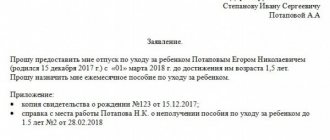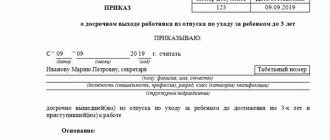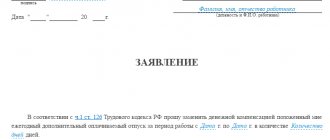Divorce is not only the division of jointly acquired property; this process affects all close people on the part of both spouses. But the biggest blow falls on children.
Meanwhile, the dissolution of a marriage does not happen out of nowhere, and in most cases, former spouses remain sworn enemies, which prevents them from thinking sensibly and pushes them exclusively to negative actions. In this war, various methods are used, but the most effective is the manipulation of children. The spouse with whom the minor remains, in every possible way prevents the other from communicating with the child. In such a situation, you should write a statement to the guardianship authorities about the procedure for communicating with the child; a sample is attached to the article. This allows us to solve the problem in a civilized manner and with less psychological trauma for children.
Right to communicate with a child
Each baby is born as a result of a relationship between two people, which means that two parties have the right to communicate with them. A child does not always have two legal parents; for some reason, one of them may not exist; however, even here we cannot talk about an indisputable monopoly in communication of only one parent. When it comes to a full-fledged family, the connections are much broader - parents and their closest relatives.
After a divorce, the child remains with one of the parents; if there are several children, then they should not be divided between mom and dad. Often, the role of the other party is reduced only to paying alimony. But the dissolution of a marriage between adults in no case breaks family ties. The second party, which consists of the other parent and his close relatives, also has the right to participate in the life of the child. It is as follows:
- Communication with the child.
- Obtaining information about a minor in medical and educational institutions.
Important!
The second parent has the right to allow the minor to travel abroad. This right also has a downside - it can prohibit travel abroad, which will not allow the child to leave the territory of the Russian Federation.
Other parent
In our country, legislation is structured in such a way that in the event of a divorce, children in the vast majority of cases remain with their mother. The father often stays outside their lives consciously, not wanting to participate in their fate in any way, but it also happens that he is sincerely drawn to the children, and the ex-wife prevents this. But it should be remembered that only a court can prohibit communication when the father is deprived of parental rights. If the second parent is not deprived of his rights or limited in them, he can also freely participate in the lives of his children.
By law, minors must have contact with both parents, regardless of the fact that they no longer live together. But adults manipulate children, setting them up to suit what they need, infringing on their interests and pursuing their own goals. Often there is no direct ban on communication, but insurmountable obstacles are created that alienate the second parent from their own children.
Relatives
Divorce not only splits apart former spouses, but also destroys the family ties that were established after the wedding. As a rule, the side of the one who raises minors also remains close to them. But the second branch goes further and further. Offended by her ex-husband, the wife creates obstacles for the children to communicate not only with him, but also with his parents and other relatives. Such behavior not only destroys the psyche of minors, but is also illegal, since according to established legal norms, relatives have the right to communicate and participate in the lives of children.
For minors, relatives are:
- Mom and Dad.
- Brothers and sisters, and not only only-begotten ones, but also those who are related only by one of the parents.
- Grandmothers and grandfathers.
The remaining relatives are not closely related, but the issue of communication must be resolved peacefully.
Subject of proof in cases of determining the order of communication with a child
The subject of evidence means a list of circumstances that the court must establish when considering a case to determine the order of communication with a young child.
From the cited articles. Art. 55 and 66 of the RF IC it follows that the court, when resolving a dispute, proceeds from the balance of interests of the parents and the minor child.
The guideline for law enforcement practice is set by clause 8 of the Resolution of the Plenum of the Supreme Court of the Russian Federation of May 27, 1998 N 10 “On the application of legislation by courts in resolving disputes related to the upbringing of children.”
The resolution states that when determining the order of communication between a parent and a child, the following are taken into account :
- child's age;
- his state of health;
- attachment to each parent;
- other circumstances that can have an impact on the physical and mental health of the child, on his moral development.
In exceptional cases, when a child’s communication with a parent living separately may cause harm to him, the court, based on paragraph 1 of Art. 65 of the RF IC, which does not allow the exercise of parental rights to the detriment of the physical and mental health of children and their moral development, the applicant has the right to refuse to satisfy the claim to determine the procedure for his participation in the upbringing of the child, setting out the reasons for the decision made.
The parent who asks to determine a schedule for the child to meet with him or her has the responsibility to prove that communication with the father does not contradict the interests of the minor.
At the same time, he has everything necessary to create favorable conditions during his stay with him.
Legislation
Legislative norms regarding communication with children of their parents or relatives are enshrined in the Family Code of the Russian Federation. The main answers to these questions are enshrined in:
- Article 66 of the RF IC, which states that a mother or father who lives with minors cannot prohibit the second parent from seeing them or taking part in their upbringing.
- Article 67 establishes another norm, which states that parents should not prevent other relatives of children from seeing them.
Important!
The Family Code of the Russian Federation takes into account the interests of all parties, but the rights of minors always remain paramount. Since they themselves cannot make decisions and bear responsibility, and adults often manipulate them in their own interests, the law clearly gives equal rights to mom and dad and other close relatives for regular contact with children.
| In ______________________________ (name of the court) Plaintiff:__________________________ (full name, address) Defendant: _______________________ (full name, address) Guardianship and trusteeship authorities: ____ (full name, address) |
STATEMENT OF CLAIM to remove obstacles to communication with a child, establish a procedure for participation in raising a child
“___”_________ ____, a marriage was registered between me and the defendant _________ (full full name). From this marriage there is a common minor child _________ (full name, date of birth).
Since ____, the marriage relationship between me and the defendant has actually been terminated, there is no common household. The marriage is dissolved (not dissolved). The child lives with the defendant. The child's health status is _________. He is attached to each of his parents. When considering the case, I ask you to take into account _________ (indicate circumstances that could have an impact on the physical and mental health of the child, on his moral development).
My personal qualities at home and at work are characterized positively.
Provisions of Art. 66 of the Family Code of the Russian Federation gives me, as a parent living separately from the child, the right to communicate with him, participate in his upbringing and resolve issues regarding the child’s education.
The defendant, taking advantage of the fact that the child has been living with her since ____ to the present, prevents our meetings with the child and my participation in his upbringing. Thus, the defendant violates my rights as the father of the child, as well as the rights of the grandfather, grandmother (brothers, sisters and other relatives of the child).
Based on the above, guided by art. 61, 63, 67 Family Code of the Russian Federation, Art. 131-132 of the Civil Procedure Code of the Russian Federation,
Ask:
1. Oblige _________ (full name of the defendant) not to interfere with my communication with the minor _________ (full name, date of birth).
2. Determine the following order of communication between the father and the child:
— oblige the defendant in this case to provide the plaintiff with the opportunity to meet with the child ___ days a week, including ___ days on weekdays _________ (indicate which) and on weekends _________ (indicate which);
— oblige the defendant to provide the plaintiff with the opportunity to spend vacation with the child for at least 2 weeks a year, for which to draw up all the necessary documents;
— oblige the defendant to resolve issues related to the education, upbringing of the child and other similar issues only together with the plaintiff.
List of documents attached to the application (copies according to the number of persons participating in the case):
1. Copy of the statement of claim
2. Copy of marriage certificate
3. Copy of the child’s birth certificate
4. Characteristics from the place of work (residence) of the plaintiff
5. Information about the plaintiff’s work schedule
Date of application “___”_____________ 0000000000000000000000 Signature of the plaintiff _______
Obstacles in communication
In rare cases, ex-spouses maintain good relations and communicate in a friendly atmosphere. This allows children to communicate with both parents without any obstacles on their part. But most situations are radically different from this idyllic picture. A simple example is that the parent with whom the minors are staying often prevents them from communicating with the other party, either the father or mother, or his relatives. It happens that the confrontation does not last long, and the parties still manage to come to an agreement peacefully, but more often it is not possible to resolve the conflict on their own.
In a peaceful settlement regarding the future communication of the second parent with the children, it is best to put everything on paper in the form of an agreement. This can be a document drawn up in any format and voluntarily signed by both parties. It should include:
- When a father or mother who does not live together can take the child to spend time together. It is best if specific days of the week or dates of each month are written down. It is important to specify the total number of days per month that the other party can count on.
- The duration of such communication. It is worth indicating how many hours minors can stay with their second spouse.
- If the parties have any special restrictions regarding places where minors should not go, then these should also be indicated in order to avoid misunderstandings.
- Perhaps it should also be clear who can attend them. For example, the ban often applies to new wives or husbands.
Note!
The reluctance of one spouse to meet the other halfway, expressed in not allowing him to communicate with children, allows the trampled party to turn to government agencies for protection. When it comes to minors, all conflict situations are resolved with the help of guardianship authorities.
Drawing up an application
Submitting an application to the guardianship authorities is another step towards a peaceful resolution of the conflict situation. This document is written in a conditionally free form. You don’t need a special form to compile it, but some rules should still be followed. In an application for guardianship about the procedure for communicating with a child, a sample is attached to the article, you must describe the situation using a simple template:
- To whom is the petition submitted?
- In whose name is it written?
- Information about when the marriage broke up. If the spouses are not yet divorced, then write this down. If living in a civil marriage, this fact and the period of cohabitation should also be indicated.
- Information about the minor himself - full name, date of birth.
- Information about the parent who prevents visits with the child - full name, where he lives, where he works and on what schedule, contact numbers.
- Reasons for seeking help from guardianship. Here special attention should be paid not only to what the essence of the conflict is, but also to describe whether there were attempts to resolve the issue peacefully.
- Request for assistance in resolving the situation.
- Signature and date.
Note!
The applicant is recommended to attach a schedule of meetings with children to the application. He draws it up based on his own considerations and the availability of free time, but also taking into account the interests of minors.
How to write a statement correctly: requirements for form and content
To write an application to the guardianship authority, you must understand that no special forms are provided for them; the application is written in free form. There are some requirements for the content and indication of information in the appeal. This type of statement is a petition, an appeal to the authorized bodies.
So, the application must contain the following information:
- the name of the body to which the appeal is being made - usually the head, chief, director is indicated;
- the applicant’s personal data – surname, initials, passport details and place of registration;
- title of the document – APPLICATION;
- Next, the data of the parent who is preventing communication, information about marriage (date) or other, as well as data about divorce, if any, are indicated.;
- the details of the minor are indicated - date of birth, what he does (attends kindergarten or school and other important characteristics);
- then the essence of the conflict itself is described, what the problem actually is;
- in conclusion indicate a request for help and assistance in resolving the current conflict;
- You can indicate your proposals for getting out of a conflict situation;
- The date of preparation of the document is indicated and a signature is placed.
A statement is an appeal that must contain maximum information on this case, indicating all the circumstances that occurred when problematic situations arose, including the psychological state of the child during meetings with the parent.
The application must be accompanied by documents confirming the birth of the child or a copy of the page from the passport containing information about the child. In addition, the statement indicates the reason for the conflict or problems that impede communication.
When describing the solution to the problem on the part of the applicant, the time of communication that could suit the applicant is indicated. These may be weekends or holidays, holidays, certain days of the week in accordance with working hours.
Dear readers! To solve your problem right now, get a free consultation
— contact the on-duty lawyer in the online chat on the right or call:
+7
— Moscow and region.
+7
— St. Petersburg and region.
8
- Other regions of the Russian Federation
You will not need to waste your time and nerves
- an experienced lawyer will take care of solving all your problems!
Contacting the guardianship authority
The application must be submitted to the department of guardianship and trusteeship authorities. You should apply at the place of registration of the children, and not at the applicant’s address. The help of specialists from this department consists of going to the specified address and finding out why the other party is preventing communication. This often takes a lot of time, since in the process of clarifying the circumstances the following may be interviewed:
- Former spouse.
- The child himself.
- Close relatives.
- Neighbours.
- And even acquaintances.
Of course, such in-depth research is not always necessary, but in case of serious conflicts or accusations against the ex-husband/wife, guardianship officials try to understand the situation. Their goal is a peaceful resolution of the dispute and reconciliation of the parties.
Norms of the Family Code of the Russian Federation for grandparents
The rights of a child to communicate with his grandparents are regulated by Articles 55 and 67 of the Family Code of the Russian Federation. According to paragraph 1 of Art. 55, the child has the right to communicate with both parents, grandparents, brothers and sisters and other relatives. The child's rights are not affected by the parents' divorce or separation. If a minor finds himself in an extreme situation (for example, arrest, detention), he can communicate with his family in the manner prescribed by law.
Grandfathers and grandmothers, according to Article 67 of the Family Code of the Russian Federation, have the right to communicate with the child after the divorce of their parents. If a parent living with a child prevents his son or daughter from communicating with relatives, the guardianship and trusteeship authority may oblige him. In the event that a parent does not comply with the decision of the guardianship and trusteeship authorities, close relatives or representatives of the guardianship authorities may initiate legal proceedings. An experienced family dispute lawyer will help you draw up a statement of claim to remove obstacles in communication with your child. The court will resolve the dispute based on the interests of the minor citizen and taking into account his opinion (if he has already reached the age of ten).
If a parent, even after the court decision has entered into legal force, continues to prevent the child from communicating with relatives, the measures provided for by the Civil Procedure Code of the Russian Federation will be applied to him.
But in this matter, as in any other, there are nuances. If the parent who lives with the child proves in court that communication with relatives living separately has a negative impact on the child, the court may take his side and limit the child’s communication with these people, or allow meetings only in the presence of the parent who lives with child.
Getting the result
Whatever the result of the conversation between guardianship officials and the conflicting parties, upon completion of clarification of the situation, they are obliged to give a written conclusion to the applicant.
If a positive result is achieved, the former spouses may be invited to the department to draw up a peace agreement. Although they can do this on their own, this body in this case acts as a third party to the dispute resolution and helps to reach a mutually beneficial agreement.
If the employees of the guardianship department were unable to persuade the ex-spouse to reconsider his positions, then in a written response they state this fact and advise the applicant to go to court. The court will force the parties to reach an agreement.











